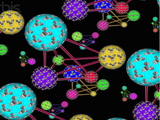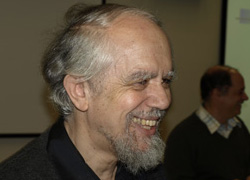IMDEA Networks

Event Category: In-house Presentation
Modeling D2D Communications in Cellular Access Networks via Coupled Processors
We present a first fully analytical approach to performance evaluation of D2D communication systems, which does not assume transmitters to have always a packet to transmit. In particular, we adopt a Coupled Processors model to describe a cellular scenario with D2D users sharing radio resources with cellular users, i.e., adopting in-band underlay D2D schemes. We derive sufficient conditions for stability of such system, and we characterize the effects of D2D transmissions on cellular user performances.
Read more arrow_right_altSafe Connected Vehicles
Our objective is to guarantee that vehicles that coordinate their operations will operate safely with all of the other vehicles, implemented by all of the other manufacturers, on the roadway.
Read more arrow_right_altThe BGP Visibility Scanner
By tweaking the BGP configurations, the network operators are able to express their interdomain routing preferences, designed to accommodate a myriad goals. Given the complex interactions between policies in the Internet, the origin AS by itself cannot ensure that only by configuring a routing policy it can also achieve the anticipated results. Moreover, the definition of routing policies is a complicated process, involving a number of subtle tuning operations prone to errors. In this paper, we propose the BGP Visibility Scanner which allows network operators to validate the correct implementation of their routing policies, by corroborating the BGP routing information from approximately 130 independent observation points in the Internet. We exemplify the use of the proposed methodology and also perform an initial validation for the BGP Visibility Scanner capabilities through various real operational use cases.
Read more arrow_right_altRIA-ICCS: Intercell Coordinated Scheduling Exploiting Application Reservation Information
Intercell coordination and cooperation techniques are some of the most promising approaches to increase the spectral efficiency of future wireless systems as required by
the forecasted market needs. Among them, intercell coordinated scheduling (ICCS) arises as a near-term feasible solution due to its lower inter-BS communication requirements when compared to full cooperative approaches. In this paper we present our proposed Reservation Information Aware Intercell Coordinated Scheduling (RIA-ICCS) solution which considers application reservation information when constructing an interference graph for ICCS purposes.
Adaptive Modulation for Finite-Horizon Multicasting of Erasure-coded Data
We design an adaptive modulation scheme to support opportunistic multicast scheduling in wireless networks. Whereas prior work optimizes capacity, we investigate the finite horizon problem where (once or repeatedly) a fixed number of packets has to be transmitted to a set of wireless receivers in the shortest amount of time -- a common problem, e.g., for software updates or video multicast.
Read more arrow_right_altEnergy-Efficient Wireless Access Networks
Energy efficiency is one of the great technological challenges of our times. Recently, the concerns for the environmental consequences of the huge rate with which energy is consumed is leading to the awareness that electricity consumption and waste should be reduced in all sectors. The ICT (Information and Communication Technology) sector makes no exception, since it is becoming a major component of the worldwide energy consumption budget.
Read more arrow_right_alt
Online Testing of Distributed Systems
It is notoriously difficult to make distributed systems reliable. This becomes even harder in the case of the widely-deployed systems that are heterogeneous (multiple implementations) and federated (multiple administrative entities).
Read more arrow_right_altVirtual Reality and Haptics Applications in e-Learning, Industrial Training and Medical Education
Nicolas Georganas received the Dip. Ing. (Diplom-Ingenieur - German equivalent of M.Sc. degree) in Electrical Engineering from the National Technical University of Athens (Athens, Greece) in 1966. He went on to achieve his Ph.D. in Electrical Engineering (Summa cum Laude) in 1970 from the University of Ottawa (Ottawa, Canada). In 2004, he was conferred a Dr-Ing. (Doktor Ingenieur) (honoris causa) in Electrical Engineering by the Technische Universität Darmstadt (Darmstadt, Germany). In 2007, he was awarded his second Ph.D. (honoris causa) in Electrical and Computer Engineering by the National Technical University of Athens. He currently holds the position of Distinguished University Professor in the School of Information Technology and Engineering (SITE) of the University of Ottawa. In addition to this, he is also a Visiting Researcher at IMDEA Networks and a Cátedra de Excelencia at University Carlos III of Madrid (UC3M). In 1986 he became the Founding Dean of the University of Ottawa’s Faculty of Engineering, and from 2005-08 served as Associate Vice-President, Research (External).
Read more arrow_right_altFlat Access and Mobility Architecture: an IPv6 Distributed Client Mobility Management solution
The use of centralized mobility management approaches – such as Mobile IPv6 – poses some difficulties to operators of current and future networks, due to the expected large number of mobile users and their exigent demands. All this has triggered the need for distributed mobility management alternatives, that alleviate operators’ concerns allowing for cheaper and more efficient network deployments.
Read more arrow_right_alt
Algorithmic Mechanisms for Internet Supercomputing under Unreliable Communication
This work, using a game-theoretic approach, considers Internet-based computations, where a master processor assigns, over the Internet, a computational task to a set of untrusted worker processors, and collects their responses. The master must obtain the correct task result, while maximizing its benefit. Building on prior work, we consider a framework where altruistic, malicious, and rational workers co-exist. In addition, we consider the possibility that the communication between the master and the workers is not reliable, and that workers could be unavailable; assumptions that are very realistic for Internet-based master-worker computations.
Read more arrow_right_alt











Recent Comments